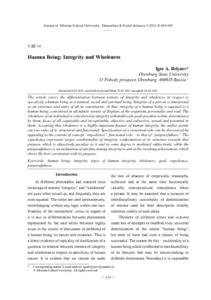Человек: целостность и цельность
Скачать файл:
URI (для ссылок/цитирований):
https://elib.sfu-kras.ru/handle/2311/2354Автор:
Беляев, И.А.
Belyaev, Igor А.
Дата:
2011-05Аннотация:
The article covers the differentiation between notions of integrity and wholeness in respect to
specificity a human being as a natural, social and spiritual being. Integrity of a person is interpreted
as an existence and unity of all its constituents. At that, integrity of a human being is equated to a
human being, considered in all infinite variety of displays of the organism, personality and soul. The
wholeness of an individual is considered as integrity with multiscale goals peculiar to him, determinacy
by them, focus of all cognizable and incognizable, objective and subjective, actual and potential in
them. Accepting that wholeness is a highly important feature of human integrity, the author points
out two sides of it: structural and functional. Specification of a structural side can be discovered by
appealing to the content of concept expedience, functional side - to that of purposefulness. The
expediency represents target conditionality of integrity, conformation of its structure towards that
purpose which is objectively peculiar to it and to some degree is mediated subjectively, while the
purposefulness is an inclination of any functioning integrity to aim at the resulting achievement, which
shows the best correlation with its purpose. Статья посвящена разграничению содержания понятий целостности и цельности
применительно к специфике человека как природно-социально-духовного существа.
Человеческая целостность связывается автором с наличием и единством всех присущих
ей частей. При этом целостность человеческого существа отождествляется с ним
самим, взятым во всём практически безграничном многообразии проявлений его организма,
личности и души. Под цельностью человека понимается проникнутость его целостности
свойственными ему разномасштабными целями, определённость ими, средоточие
всего познаваемого и непознаваемого, объективного и субъективного, актуального и
потенциального в них. Признавая цельность исключительно важной фундаментальной
характеристикой человеческой целостности, автор выделяет в ней две стороны:
структурную и функциональную. Специфика структурной стороны раскрывается при
обращении к содержанию понятия «целесообразность», функциональной - понятия
«целеустремлённость». Целесообразность выступает здесь как целевая обусловленность
целостности, соответствие её структуры той цели, которая ей свойственна объективно и
в какой-либо мере опосредована субъективно, целеустремлённость - как склонность всякой
функционирующей целостности стремиться к достижению результата, в наибольшей мере
соответствующего её цели.

